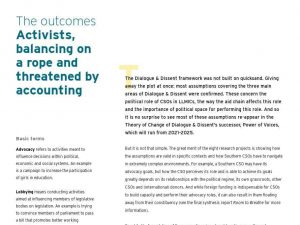
A few weeks ago, the Ethiopian Parliament adopted a new law governing civil society organizations (CSOs). It is hard to overstate what an important and remarkable step this is for the sector. Up until now, Ethiopian law has radically constrained the work and political space of CSOs. In this blog post, we outline some of the key features of the new law and how it differs from the old regulatory system.
A new era for civil society in Ethiopia
A wave of protests in 2017, followed by the surprise resignation of the then Prime Minister, Hailemariam Desalegn, in February 2018, opened the way for a new political era in Ethiopia. As part of a more democratic, transparent and accountable government, the new Prime Minister, Abiy Ahmed, committed to repealing and revising a series of repressive laws, including the Charities and Societies Proclamation of 2009. Although the 2009 Proclamation states that its purpose is to ensure the right to freedom of association, in reality it restricts and controls the activities and funding of CSOs. Over the past few months, a drafting committee has prepared a new CSOs law, which has been adopted by Parliament and will soon replace the 2009 Proclamation, ushering in a new era for civil society in Ethiopia.
The 2009 Charities and Societies Proclamation
The 2009 Proclamation categorized CSOs into three groups: Ethiopian charities and societies, Ethiopian resident charities and societies, and foreign charities. Under this law, Ethiopian charities and societies were not allowed to raise more than 10% of their revenue from foreign sources. Ethiopian resident charities and societies and foreign charities were allowed to receive funds from foreign sources, but prohibited from carrying out advocacy activities. These restrictions were defended by the State as necessary to ensure that activities of a political nature were carried out by the government and not by ‘foreign agents’.
The 2009 Proclamation sought to transform civil society into a service sector. One of the ways it did this was by regulating the use of funds by CSOs. The law required CSOs to allocate 70% of their budget to operational costs and 30% to administrative activities. The ‘70/30 rule’ was meant to ensure that the bulk of CSO funding benefited those in need. However, the Proclamation defined administrative activities so broadly that it included a wide range of costs that would normally have been considered part of the cost of implementing a programme. As a result, organizations were unable to train staff, commission studies, network, or participate in workshops.
Perhaps the single greatest problem with the 2009 Proclamation was the oversight of CSOs by the Charities and Societies Agency. The Agency was mandated to oversee and administer the registration, reporting and other activities of CSOs and had wide discretion over their closure, as well as a range of decisions affecting their day-to-day operations. CSOs complained of extraordinary bureaucratic delays, high staff turnover and corruption, resulting in them having to wait weeks (sometimes even months) to open bank accounts, finalise contracts, purchase vehicles and so forth. The Agency was perceived by many as bureaucratic, incompetent and generally opposed to civil society.
The 2018 Proclamation – a broadening of civic space in Ethiopia
The new 2018 Proclamation takes an entirely new approach to the regulation of CSOs. This is unsurprising as the committee appointed to redraft the law included a number of civil society representatives and consulted CSOs and members of the public. It departs from the previous categorization system, referring only to indigenous (local) and foreign CSOs. It explicitly provides that all organizations have the right to engage in any lawful activity to accomplish their objectives. In other words, foreign and foreign-funded CSOs are no longer prohibited from engaging in advocacy and human rights work. In fact, the new law specifically encourages CSOs to engage in advocacy and lobbying in regard to laws and policies “which have a relationship with the activities they are performing”.
While the old categorization of organizations has been abandoned, a shadow of this old system can be found in the limitation on lobbying political parties. The new law states that foreign organizations and indigenous organizations established by foreign citizens resident in Ethiopia may not lobby or influence political parties, nor may they engage in voter education or electoral observation, unless otherwise allowed by law. However, the law provides that foreign citizens resident in Ethiopia can avoid this restriction by establishing CSOs jointly with Ethiopian citizens. The law also actively calls on all CSOs to contribute to democratization and promoting the rights of their members.
One surprising development is that state control over the distribution of funds is still in place. The 70/30 rule has been replaced by an 80/20 rule: only 20% of a CSO’s income can be spent on administrative costs. At first glance, this appears to be a setback. However, the law now defines administrative costs more precisely as including salaries of administrative employees, rent, bank fees, and attorney fees, among other things. They do not include training, research, or networking. This is a significant improvement, even though it involves continued state oversight of spending.
Although the new law also establishes a Civil Society Organizations Agency to oversee the registration and reporting of CSOs, its discretion has been significantly limited. The new law sets time limits on the administrative duties of the Agency (e.g. it must approve the opening of a bank account within five days). While it is not unimaginable that incompetence, high staff turnover and corruption will impede the new Agency and render these time limits meaningless, CSOs can now challenge the decisions of the Agency, something they could not do under the 2009 Proclamation.
The new Agency’s board will also be more representative. Under the 2009 Proclamation, the Board comprised seven members, all of whom were appointed by the government, including two members from the CSO sector. The new law increases the representation of CSOs to three and stipulates that they be selected by a Council of CSOs, not the government. The Council of CSOs is a new entity to be established by CSOs, but convened by the Agency. The law seems to envision a CSO-led entity, established with the assistance of the State.
Perhaps one of the most important developments in the law is that it advances the self-regulation of CSOs. The new law defines this as “a regulatory system led by a voluntary code of conduct adopted by Organizations through the Council to govern themselves”. The Council’s primary tasks are to: enact a code of conduct and devise enforcement mechanisms in consultation with the Agency, donors and other stakeholders; advise the Agency on the registration and administration of organizations; and represent and coordinate the sector. This move to self-regulation marks a significant shift. However, a number of questions remain, such as whether the Council can effectively represent a sector as large and diverse as the Ethiopian CSO sector. Questions also arise as to whether a relationship of trust and goodwill can be maintained between the Council and the Agency and whether close collaboration between these entities will jeopardize the Council’s independence.
Without losing sight of these questions, the shift to self-regulation is promising. It demonstrates a change in the way CSOs are perceived. They are no longer seen by the State as untrustworthy and self-serving, but as an important sector and best positioned to ensure CSOs are accountable, transparent, and committed to good governance and their beneficiaries. Ethiopia appears to have bucked a global trend towards shrinking political space, as it moves towards greater respect for the right to freedom of association and recognition of the value and importance of a thriving civil society sector.



Ethiopian new law of civil Society very obstacle for new orgsnizations to accomplish work becau5se of 20-80 low
It is very help full law for CSOs. Therefore, I need always highly update information